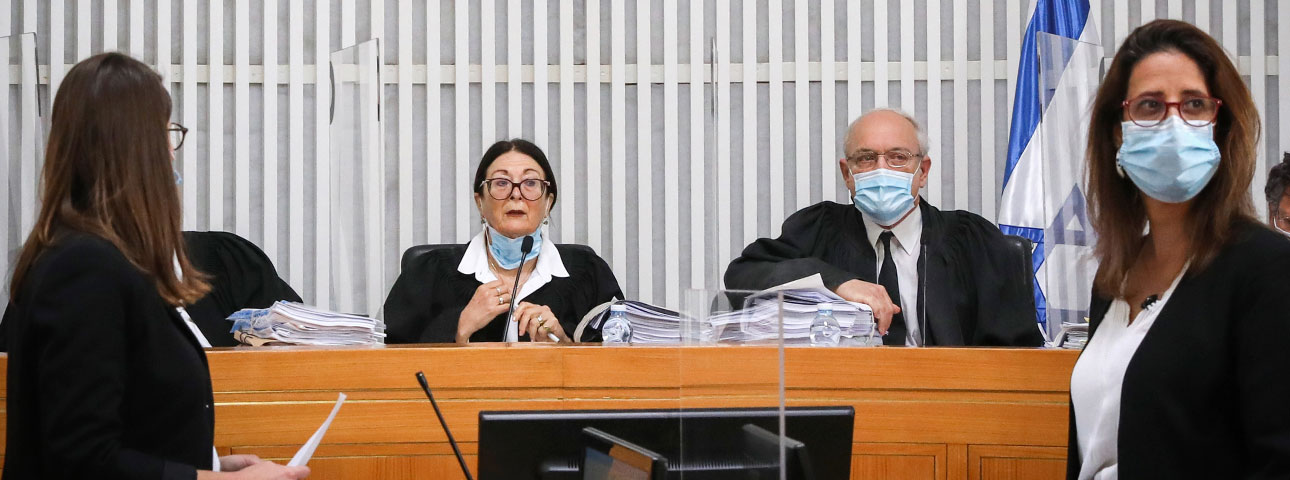Live Broadcasts from the Supreme Court
Live broadcasts brings a breath of fresh air and a better understanding of the Supreme Court

Supreme Court | Flash 90
The decision of the Chief Justice of the Supreme Court, Esther Hayut, to allow live broadcasts of the court’s recent proceedings may prove to be one of the most important rulings in the history of the Supreme Court, despite its administrative- rather than judicial nature. Difficult times provide fertile ground for change and revolution, and there is no question that these are particularly challenging times for the court’s status in Israel. Never before have senior politicians, including the prime minister himself, dared to threaten the Supreme Court so brazenly that if the court reaches a decision that doesn’t sit well with them, they will resort to a doomsday scenario of a fourth round of elections. Moreover, they have even directly threatened the very standing of the court with the possible legislation of a far-reaching override clause.
From the outset, the reasons for traditionally prohibiting direct television coverage of court proceedings carry less weight, when it comes to Supreme Court discussions. The main issue relates to the individual’s right to privacy when being tried in a criminal case or sued in a civil case. Another major reason for barring live broadcasts is that they tend to add drama to any proceedings, as individuals try to address the viewers at home instead of the matters at hand, and attempt to impress them with impassioned arguments, overstated body language, and the like. The world of law has no interest in such behavior, and rightly so.
But these two issues are almost entirely irrelevant to Supreme Court cases. The matters discussed are mostly public issues that focus not on particular individuals and their distress, but rather on constitutional questions and clashes between key values, without any violation of individual privacy. Since the discussion focuses on matters of principle rather than on personal issues, there is also less temptation to engage in theatrics. Indeed, the danger usually inherent in court proceedings being televised— including demagogy and populist appeals to public opinion—would actually be a positive factor when it comes to Supreme Court justices, as it would require them to use more straightforward language that the average viewer at home would be able to understand and identify with. In this sense, the famous saying of Justice Louis Brandeis that “sunlight is the best of disinfectants” holds true not only for the essential public role played by media exposure. It can also be applied to the benefits of judicial transparency as an antidote to the poison being hurled towards the judicial system itself.
We can only hope that this important step taken by Justice Hayut is not a case of too little, too late. The danger to the standing of the Supreme Court comes not from those intellectuals, from all sides of the political spectrum, who know that the High Court of Justice has made considerable errors in recent decades, but who also understand the critical importance of this system for the overall health of Israeli democracy. Rather, the problem lies with the many, many Israelis who have no grasp of the complexities involved, and who have been incited for years to believe that the Supreme Court justices are a bunch of leftists who want to wreck the state from within, by striking at the IDF, the Jewish religion, and of course, Israel’s most important asset of all—Bibi himself.
Moreover, this public has been incited to believe that the concept of “separation of powers,” so essential to democratic rule, in fact means that no branch of state should interfere in the actions of the others. This is of course untrue, as the politicians’ own actions demonstrate. The government, as the executive branch, intervenes constantly (too much, in fact) in the affairs of the legislative branch, forces members of Knesset to vote according to the government line, and so on. The true meaning of the principle of separation of powers is almost the opposite of the populist interpretation given it in recent times. In fact, the idea is that no single branch should have exclusive power and thus, the power to have the “final say” must be divided among the various branches.
Consequently, there must be a balanced system of reciprocal oversight between the executive and legislative branches—the government and the Knesset—and the branch charged with overseeing them. The judicial branch must have the power to overrule decisions and improper actions taken by the government and the Knesset, needing a sizable majority of justices, when it comes to strike down legislation, while the Knesset should also be able (again, with a special majority) to overrule unjust rulings by court. When trust and consensus between the branches break down, perhaps it is best after all, to return to the sovereign – that is, to the people – and to seek their opinion. In this way, the public can ensure that politicians’ powers to override problematic rulings by the courts will not be abused in order to save the skins of their corrupt colleagues.
The article was published in the Jerusalem Post.
